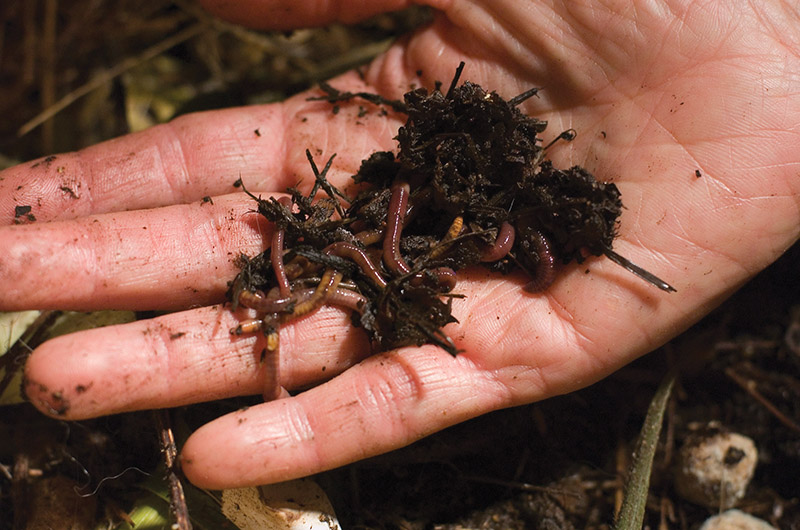Organic Composting with Red Wiggler Worms - Increase Your Yard's Growth
Organic Composting with Red Wiggler Worms - Increase Your Yard's Growth
Blog Article
Red Wiggler Worms Demystified: Unlocking the Secrets of Vermiculture for Greener Living and Nutrient-Rich Soil
In the realm of lasting practices for enhancing dirt top quality and promoting eco-conscious living, red wiggler worms play a crucial yet usually overlooked function. Red Wiggler Worms. Comprehending the details of caring for these worms, optimizing their atmosphere, and using their spreadings can lead to a greener lifestyle and healthier soil for plants to thrive.
The Role of Red Wiggler Worms
Red Wiggler worms play a crucial duty in composting systems by efficiently damaging down raw material into nutrient-rich spreadings. These voracious eaters consume a variety of organic products, such as kitchen area scraps, yard waste, and paper items. As they feed, the worms' digestive processes damage down the raw material into a penalty, dark, and nutrient-dense product called worm spreadings or vermicompost.
The castings generated by Red Wiggler worms are extremely useful for dirt health and plant development. They are rich in essential nutrients like phosphorus, nitrogen, and potassium, which are crucial for supporting healthy plant development. In addition, worm spreadings contain useful germs and enzymes that aid enhance soil framework, rise water retention, and boost nutrient uptake by plants.
Benefits of Vermicomposting

Moreover, vermicompost, the nutrient-rich output of vermicomposting, acts as an outstanding natural fertilizer and soil conditioner. It boosts soil structure, enhances soil oygenation, and boosts dirt dampness retention. These residential or commercial properties add to much healthier plants with stronger root systems and far better resistance to conditions and bugs. Vermicompost also enhances the soil with necessary nutrients like nitrogen, phosphorus, and potassium, advertising plant growth and total dirt fertility.
Additionally, vermicomposting supports sustainable horticulture methods by providing a chemical-free and all-natural choice to synthetic fertilizers. Red Wiggler Worms. This ecologically pleasant technique not only improves the soil but likewise helps reduce dependence on unsafe chemicals, promoting a greener and much more sustainable means of gardening
Setting Up a Worm Bin
When establishing a worm bin for vermicomposting, proper arrangement is vital to make certain the success of the composting procedure. The first step in establishing up a worm container is selecting an appropriate container.
After including the bed linens, present the red wiggler worms to the container. It is advised to start with a handful of worms and slowly enhance as they multiply. The worms should then be supplied with food scraps such as fruit and vegetable peels, coffee grounds, and eggshells. It is important to avoid adding meat, milk, oily, or salty foods to stop attracting insects and creating undesirable smells.
Regularly keep track of the wetness degrees and temperature in the worm container to make certain optimal problems for the worms. With correct setup and upkeep, the worm container will effectively convert natural waste into nutrient-rich compost for your plants and yard.
Collecting Worm Castings
To successfully collect nutrient-rich worm castings from your vermicomposting system, a systematic harvesting technique is important. When it comes time to collect the worm castings, there are a few vital actions to comply with to guarantee a successful procedure.

Troubleshooting Common Issues
Determining and addressing more common difficulties that might occur throughout the vermicomposting procedure is essential for maintaining a healthy and balanced and effective worm container. One typical issue that vermicomposters encounter is overfeeding. Including excess food scraps can bring about an accumulation of moisture and acidity in the worm container, potentially hurting the worms. To avoid this, feed the worms in small amounts, ensuring that the food scraps are appropriately broken down prior to including extra. Another problem is unpleasant smells rising from the worm container. Foul smells indicate anaerobic conditions, generally created by overwatering or poor air flow. To correct this, change the dampness levels by adding completely dry bed linens products like shredded newspaper or cardboard and boost oygenation by turning the bed linen on a regular basis.
Furthermore, if the worm populace is decreasing or the worms appear unhealthy, maybe as a result of environmental stressors such as severe temperature levels or pH levels. Keeping track of these aspects and making required modifications is necessary for the wellness of the worms. By troubleshooting these common problems promptly, vermicomposters can make certain a effective and smooth vermicomposting procedure while preserving a prospering worm population.

Verdict
Finally, red wiggler worms play a crucial role in vermiculture by damaging down organic issue into nutrient-rich dirt. The advantages of vermiculture include greener living and improved dirt top quality. Setting up a worm bin is important for successful vermiculture, and harvesting worm castings provides beneficial compost for horticulture. By comprehending and repairing common concerns, individuals can open the keys of vermiculture for lasting living and healthier soil.
As they feed, the worms' gastrointestinal procedures damage down the organic issue right into a penalty, dark, and nutrient-dense material recognized as worm spreadings or vermicompost.
The spreadings created by Red Wiggler worms are very valuable for soil health and wellness and plant growth. Adding excess food scraps can lead to an accumulation of dampness and level of acidity in the find more information worm container, potentially harming the worms.Furthermore, if the worm population is declining or the worms show up undesirable, it might be due to environmental stressors such as severe temperatures or pH levels. Setting up a worm bin is essential for useful link effective vermiculture, and gathering worm spreadings gives valuable garden compost for gardening.
Report this page